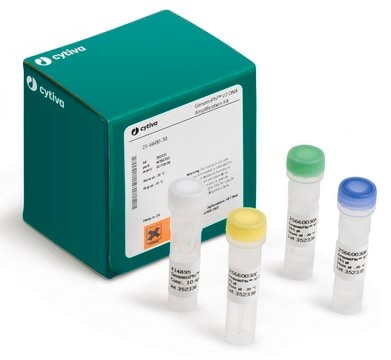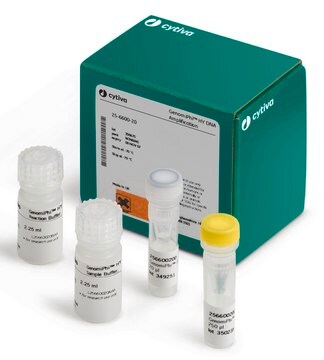GE25-6600-25
Genomiphi™ Hy Kit
Cytiva 25-6600-25, sufficient for 1000 reactions
Sign Into View Organizational & Contract Pricing
All Photos(1)
About This Item
UNSPSC Code:
41116006
NACRES:
NA.55
Recommended Products
usage
sufficient for 1000 reactions
manufacturer/tradename
Cytiva 25-6600-25
shipped in
dry ice
storage temp.
−70°C
General description
Illustra GenomiPhi™ HY DNA Amplification Kit offers highly efficient and representative whole-genome amplification with 40 to 50 μg yield from nanogram amounts of DNA sample.
Application
illustra™ GenomiPhi™ HY DNA Amplification Kit is part of the Phi29 DNA polymerase family of products from Cytiva. It contains all of the components necessary for midi-scale whole genome amplification by isothermal strand displacement amplification.
Amplification is highly uniform over the entire genome so that locus representation remains extremely close to the original DNA sample. Furthermore, amplification is carried out with very high fidelity due to Phi29 DNA polymerase proofreading activity.
The illustra™ GenomiPhi™ HY DNA Amplification Kit procedure is quick, simple and does not require a thermal cycler. A typical DNA yield of 40 to 50 μg DNA can be achieved in four h with little hands-on time. The average product length is over 10 kb. The starting material for GenomiPhi™ reactions can be purified DNA from any commercial kit or homebrew method, or a nonpurified cell lysate may be used. The kit was verified with DNA from various clinical samples including blood and buccal swabs.
GenomiPhi™ amplified DNA is suitable for various applications such as genotyping (SNP, STR, array CGH), cloning, sequencing, and DNA archiving.
Amplification is highly uniform over the entire genome so that locus representation remains extremely close to the original DNA sample. Furthermore, amplification is carried out with very high fidelity due to Phi29 DNA polymerase proofreading activity.
The illustra™ GenomiPhi™ HY DNA Amplification Kit procedure is quick, simple and does not require a thermal cycler. A typical DNA yield of 40 to 50 μg DNA can be achieved in four h with little hands-on time. The average product length is over 10 kb. The starting material for GenomiPhi™ reactions can be purified DNA from any commercial kit or homebrew method, or a nonpurified cell lysate may be used. The kit was verified with DNA from various clinical samples including blood and buccal swabs.
GenomiPhi™ amplified DNA is suitable for various applications such as genotyping (SNP, STR, array CGH), cloning, sequencing, and DNA archiving.
Features and Benefits
- Representative isothermal amplification of the whole genome.
- No template-independent, background amplification product.
- Outperforms PCR-based whole genome amplification techniques.
- Quick and simple automation-friendly protocol; no thermal cycler required.
- Yields high-quality DNA (e.g., for high-throughput genotyping, hybridization, and DNA archival).
Storage and Stability
Please be aware this product may be shipped 90 days before the expiration date. For more information on the batch specific expiration date, please contact technical service.
S-re the kit at -70°C. The enzyme mix must be s-red at -70°C; all other components may be s-red at -20°C Thaw components on ice and maintain at 0°C - 4°C during handling
Analysis Note
To view the Certificate of Analysis for this product, please visit www.cytiva.com.
Legal Information
GenomiPhi
On packaging and insert:
For use only as licensed by Qiagen GmbH. and Cytiva. The Phi 29 DNA polymerase may not be re-sold or used except in conjunction with the other components of this kit. See US patent numbers 5,854,033, 6,124,120, 6,143,495, 6,323,009, 5,576,204, and equivalent patents and patent applications in other countries.
On container:
Subject to proprietary rights of Cytiva. May not be re-sold or used except with the other components of this kit. See US patent numbers 5,576,204, and equivalent patents and patent applications in other countries.
On packaging and insert:
For use only as licensed by Qiagen GmbH. and Cytiva. The Phi 29 DNA polymerase may not be re-sold or used except in conjunction with the other components of this kit. See US patent numbers 5,854,033, 6,124,120, 6,143,495, 6,323,009, 5,576,204, and equivalent patents and patent applications in other countries.
On container:
Subject to proprietary rights of Cytiva. May not be re-sold or used except with the other components of this kit. See US patent numbers 5,576,204, and equivalent patents and patent applications in other countries.
GenomiPhi is a trademark of Cytiva
illustra is a trademark of Cytiva
Storage Class Code
12 - Non Combustible Liquids
Choose from one of the most recent versions:
Certificates of Analysis (COA)
Lot/Batch Number
It looks like we've run into a problem, but you can still download Certificates of Analysis from our Documents section.
If you need assistance, please contact Customer Support.
Already Own This Product?
Find documentation for the products that you have recently purchased in the Document Library.
E Ramos et al.
The pharmacogenomics journal, 14(3), 217-222 (2013-07-10)
Pharmacogenomically relevant markers of drug response and adverse drug reactions are known to vary in frequency across populations. We examined minor allele frequencies (MAFs), genetic diversity (FST) and population structure of 1156 genetic variants (including 42 clinically actionable variants) in
Yolanda Schaerli et al.
Nucleic acids research, 38(22), e201-e201 (2010-10-06)
In vitro reconstitution of the bacteriophage T4 replication machinery provides a novel system for fast and processive isothermal DNA amplification. We have characterized this system in two formats: (i) in circular nicking endonuclease-dependent amplification (cNDA), the T4 replisome is supplemented
Luca Pagani et al.
American journal of human genetics, 91(1), 83-96 (2012-06-26)
Humans and their ancestors have traversed the Ethiopian landscape for millions of years, and present-day Ethiopians show great cultural, linguistic, and historical diversity, which makes them essential for understanding African variability and human origins. We genotyped 235 individuals from ten
Michael S Fitzsimons et al.
Genome research, 23(5), 878-888 (2013-03-16)
The majority of microbial genomic diversity remains unexplored. This is largely due to our inability to culture most microorganisms in isolation, which is a prerequisite for traditional genome sequencing. Single-cell sequencing has allowed researchers to circumvent this limitation. DNA is
Nelson Ting et al.
Ecology and evolution, 2(3), 550-561 (2012-07-24)
It is difficult to predict how current climate change will affect wildlife species adapted to a tropical rainforest environment. Understanding how population dynamics fluctuated in such species throughout periods of past climatic change can provide insight into this issue. The
Our team of scientists has experience in all areas of research including Life Science, Material Science, Chemical Synthesis, Chromatography, Analytical and many others.
Contact Technical Service







